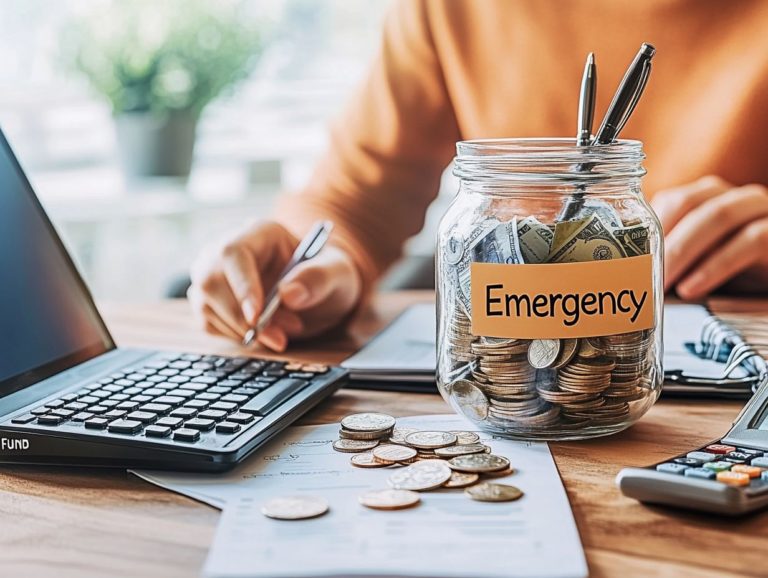5 Ways to Avoid Impulse Spending
Impulse spending has the power to swiftly undermine even the most meticulously crafted budgets, often leaving you feeling overwhelmed and financially strained.
This article presents five practical strategies to help you rein in those spontaneous purchases, ranging from establishing a robust budget to discovering healthier methods for managing emotions.
It also delves into the psychology behind impulse spending, allowing you to pinpoint your triggers and patterns.
By the conclusion, you will be armed with the necessary tools to regain control over your finances and make more intentional choices.
Contents
- Key Takeaways:
- 1. Create a Budget and Stick to It
- 2. Avoid Temptation
- 3. Set Financial Goals
- 4. Practice Delayed Gratification
- 5. Find Alternative Ways to Cope with Emotions
- What Is Impulse Spending and Why Is It a Problem?
- Frequently Asked Questions
- 1. What are 5 effective ways to avoid impulse spending, including benefits of participating in a no-spend month challenge?
- 2. How can creating a budget help me avoid impulse spending?
- 3. Why should I use cash instead of credit cards to avoid impulse spending?
- 4. What are ways to identify and avoid trigger situations for impulse spending?
- 5. Can practicing delayed gratification help me avoid impulse spending?
- 6. How can tracking my expenses help me avoid impulse spending?
Key Takeaways:

- Create a budget to track your expenses and stick to it to avoid impulsive purchases.
- Avoid temptation by unsubscribing from marketing emails, unfollowing shopping influencers, and avoiding stores when you’re feeling vulnerable.
- Set financial goals to motivate yourself and remember the bigger picture when tempted to spend impulsively.
1. Create a Budget and Stick to It
Creating a budget is your gateway to achieving financial goals. It allows you to effectively track your income and expenses. This practice helps reduce the chances of credit card debt and fosters responsible spending habits, especially during those tempting impulse shopping moments.
By establishing a clear framework for your finances, you can prioritize essential expenses while also earmarking savings for future investments or emergencies. Incorporating practical steps like determining your income, listing your fixed and variable expenses, and understanding your financial priorities can truly revolutionize your approach to money management.
Utilizing a shopping list before heading to the grocery store acts as a powerful ally against unplanned purchases, ensuring only the essentials make it into your cart. Embracing a no-spend month can challenge you to rethink your spending habits, ultimately nurturing discipline and sparking creativity in discovering alternative forms of entertainment without constantly reaching for your wallet.
2. Avoid Temptation
Avoiding temptation is vital for maintaining your stable finances, especially in a consumer-driven world where FOMO the fear of missing out on experiences or products can easily lead to impulse purchases and emotional spending, particularly with online shopping and retail therapy.
One effective strategy for minimizing these shopping triggers is to recognize your emotional spending patterns. Being aware of when stress, boredom, or sadness push you toward unnecessary shopping can make all the difference. Keeping a journal can help you identify these moments, allowing for a more mindful approach to your finances.
Limiting your exposure to promotional content on social media can significantly reduce the temptation to buy things you don t actually need. Another practical tip is to implement a 24-hour rule before making any non-essential purchases. This brief delay provides time for reflection and helps you determine whether the item is genuinely desired or merely a fleeting impulse.
Setting a strict budget and sticking to it enables you to make conscious spending decisions, putting you firmly in control of your financial destiny.
3. Set Financial Goals
Setting clear financial goals is essential in personal finance. It guides your spending habits away from impulsive buys and towards more meaningful objectives. This smart approach supercharges your saving efforts and helps you stick to effective budgeting strategies.
When you pinpoint specific targets, like saving for that dream vacation or tackling debt, you essentially craft a roadmap that promotes thoughtful spending decisions. If you’re eyeing a new smartphone in the near future, you might adjust your monthly budget by curbing dining out. Conversely, if your aim is to build an emergency fund, you might take a broader look at your finances to cut unnecessary subscriptions.
This kind of goal-setting does more than clarify your priorities; it fosters a mindset geared towards financial stability. It reinforces the significance of adhering to a well-structured budget that aligns your spending with attainable objectives, paving the way for a more secure financial future.
Take action today! Implement these strategies and start managing your finances more effectively.
4. Practice Delayed Gratification

Practicing delayed gratification is a powerful strategy for combating impulse purchases and achieving long-term financial goals. It enables you to resist the temptation of immediate satisfaction and prioritize your financial well-being through informed spending choices.
As you refine this skill, you may notice a significant reduction in credit card debt. The urge to swipe for instant gratification will start to fade. Instead of impulsively buying the latest smartphone, consider saving for a few months. This way, you can afford a better model without the weight of debt hanging over you.
This mindful approach not only enhances your budgeting outcomes but also instills a sense of accomplishment and self-control, reinforcing the habit of wise spending.
Over time, consistently opting for delayed rewards can profoundly impact your financial health and stability. This newfound discipline opens the door for future investments in personal growth or even real estate, setting you up for lasting success.
5. Find Alternative Ways to Cope with Emotions
Finding alternative ways to cope with your emotions is essential for avoiding emotional spending, which often manifests as shopping to feel better. This habit can lead to those tempting, but costly, impulse buys!
One effective strategy is practicing mindfulness. This approach encourages you to observe your feelings without judgment, enabling you to understand the root causes of your impulses.
You can also seek support from a financial coach, a professional who helps you manage your money better. They can offer valuable insights and practical tools for managing your finances more effectively.
These experts help you identify emotional triggers that may lead to unnecessary expenditures, empowering you to make informed and deliberate choices.
By cultivating awareness of your emotional states and implementing these strategies, you enhance your ability to regulate your emotions, ultimately fostering a healthier relationship with money.
What Is Impulse Spending and Why Is It a Problem?
Impulse spending is that sneaky little habit of making unplanned purchases, often triggered by emotions rather than necessity. It poses significant challenges to your personal finances, potentially leading to excessive credit card debt and sidetracking your financial goals. Understanding this phenomenon is crucial if you want to manage it effectively.
This type of spending arises from various factors such as stress, boredom, or the allure of instant gratification. A 2018 study found that nearly 70% of consumers admitted to making impulse purchases, with a staggering 23% linking their shopping costs to these spontaneous decisions.
The repercussions of such behavior can be quite detrimental, resulting in financial strain, anxiety, and a cycle of regret that threatens long-term stability. For instance, you might splurge on the latest gadget in a moment of excitement, only to later realize it wasn t in your budget. This ultimately affects your ability to save for more pressing needs.
How Does Impulse Spending Affect Your Finances?
Impulse spending can significantly harm your finances, leading to overwhelming credit card debt and adversely affecting your long-term financial goals. Those unplanned purchases can easily upend the budgets and savings plans you’ve worked so hard to establish.
Consider this: you might feel a surge of excitement and splurge on an expensive outfit or the latest gadget, only to discover later that you’ve jeopardized your ability to cover essential bills or contribute to your emergency fund. Immediate gratification makes it easy to lose sight of your budget.
To cultivate a more sustainable approach to your personal finances and avoid these pitfalls, you must keep a close eye on your spending habits today to protect your financial future! Monthly tracking or utilizing budgeting apps can be invaluable tools in this endeavor.
What Are the Psychological Triggers for Impulse Spending?

Understanding the psychological triggers behind impulse spending is essential for developing effective strategies that curb emotional purchases. Factors like social media influence, your emotional states, and environmental cues often push you toward unplanned buys.
In today s fast-paced digital landscape, carefully curated social media feeds and targeted advertising put products front and center. It s crucial for you to recognize how these influences can distort your perceptions as a consumer. You might not even realize how deeply your emotional well-being impacts your spending habits. This can lead to decisions based on fleeting feelings rather than thoughtful consideration.
By becoming aware of these psychological triggers, you enable yourself to pause and reflect before succumbing to those urges. This guides you toward more informed financial choices. With this understanding, you can build a better relationship with money, allowing you to resist the tempting allure of impulse purchases.
How Can One Identify Their Own Impulse Spending Patterns?
Identifying your own impulse spending patterns is a crucial step toward curbing unnecessary expenses and aligning your spending habits with your financial goals. This self-awareness can illuminate how frequently and why those impulsive purchases sneak into your daily life.
By leveraging tools like apps that help you manage your money or keeping a detailed spending journal, you can uncover insights into your financial behaviors. Tracking your purchases helps you recognize the triggers behind these impulses and sheds light on areas where your spending might be excessive.
As you start to notice patterns, it becomes easier to develop strategies for healthier shopping habits. You might set limits on non-essential items or implement a waiting period before making a purchase.
This approach helps you build a more intentional relationship with your money, enabling you to prioritize your financial objectives with greater effectiveness.
What Are Some Strategies for Overcoming Impulse Spending?
Implementing effective strategies to overcome impulse spending is your ticket to financial stability! This includes budgeting tips, engaging in a no-spend month challenge, and adopting techniques that minimize pesky unplanned purchases.
By crafting a comprehensive shopping list and sticking to it, you can significantly decrease the chances of acquiring unnecessary items. Setting specific spending limits for different categories like groceries or entertainment fosters disciplined financial behavior and enhances your overall well-being.
Practicing mindfulness is key; take a moment to reflect on the emotional triggers that lead to impulse buys. This self-awareness enables you to make more intentional choices. For instance, if you notice that stress drives you to shop, consider opting for a relaxing activity that lifts your spirits while saving you money. Additionally, you might want to explore 5 ways to improve your budgeting skills to help manage your finances better.
How Can One Stay Accountable in Their Efforts to Avoid Impulse Spending?
Staying accountable in your efforts to avoid impulse spending is essential for achieving long-term financial success. You might find it beneficial to explore various avenues, such as collaborating with a financial coach, establishing clear budgeting practices, and involving friends or family in your financial journey. This support can reinforce positive shopping habits and keep you on track.
Embracing modern technology can significantly enhance your financial discipline. Numerous apps are designed specifically to help you track your spending and create budgets. These tools enable you to monitor your financial progress and send timely alerts to pause and reconsider before making unplanned purchases.
Being part of a financial group or community creates a supportive environment where you can exchange tips and success stories with others, motivating one another along the way. Having an accountability partner offers the emotional support you need, ensuring your budgeting goals stay in focus while addressing temptations together.
Frequently Asked Questions

Summary:
- Recognize psychological triggers to manage impulse spending.
- Identify your spending patterns for better financial alignment.
- Implement strategies like creating shopping lists and setting limits.
- Stay accountable with support from technology and community.
Don’t let impulse spending dictate your life take action now!
1. What are 5 effective ways to avoid impulse spending, including benefits of participating in a no-spend month challenge?
Here are five strategies to steer clear of impulse spending: create a budget, use cash instead of credit cards, identify and dodge trigger situations, practice waiting before buying, and track your expenses.
2. How can creating a budget help me avoid impulse spending?
A budget helps you plan your expenses and see how much money you can actually spend. Sticking to it prevents you from overspending on impulse buys.
3. Why should I use cash instead of credit cards to avoid impulse spending?
Cash limits your spending to what you physically have. This makes it much harder to make impulsive purchases compared to using credit cards, which can lead to debt.
4. What are ways to identify and avoid trigger situations for impulse spending?
Common triggers include sales, ads, and peer pressure. Recognizing these can help you avoid them or handle them better, like making and sticking to a shopping list.
5. Can practicing delayed gratification help me avoid impulse spending?
Yes! Delayed gratification means waiting to buy something until you re sure it s what you want. This approach can save you money and curb impulse spending.
6. How can tracking my expenses help me avoid impulse spending?
Tracking your expenses shows you where your money goes. This awareness lets you make smarter spending choices and stay within your limits.






